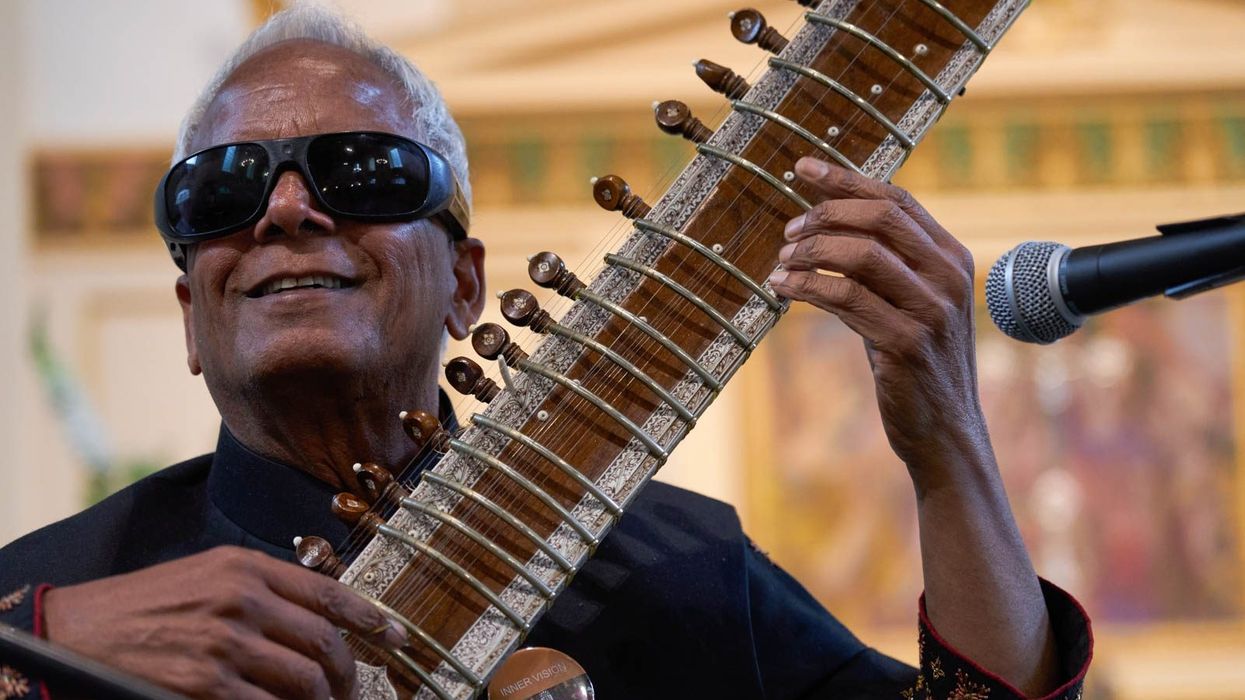BEING blinded as a baby hasn’t stopped the brilliantly talented Baluji Shrivastav OBE from becoming a globally acclaimed musician and one of the very best live performers.
The multi-instrumental marvel has had many magical moments and set up Inner Vision, which is a path-breaking orchestra comprising of blind and partially sighted musicians. His many contemporary and commercial collaborations with world-famous performers have enabled him to cross multiple musical frontiers with Indian classical music.
His two forthcoming concerts see him perform alongside renowned opera singer Patricia Rozario OBE for a night of Goanese music on April 2 at St John’s Church in London and deliver a show with the incredible Inner Vision orchestra at Wiltshire Music Centre in Bradford-on-Avon on May 7.
Eastern Eye caught up with the maestro to discuss music, live performance and his two forthcoming shows.
You are at your best live, how did you handle lockdown and not being able to perform your music?
The pandemic made me rethink how to keep music alive remotely. We discovered that using Jamulus software, enabled musicians to rehearse in real-time together. So, I kept playing with members of my orchestra and music friends globally. I had time to reflect, practise and develop new compositions. I also presented some online music workshops, live streamed concerts from the roof of my house and delivered a TEDX filmed presentation. I also explored western harmony and orchestration further. What I really missed was the inspiration of the audience and hearing their applause. I really connect with their vibration.
Tell us about the show you are doing with Patricia Rozario?
The evening of Goan music is a very unusual event, including songs in Konkani by distinguished Goan composers. There is a vibrant Goan community in UK and Patricia Rozario OBE is their glittering musical star with an impressive career as an inspiring opera singer. She will be joined by baritone Oscar Castellino, who sang the role of Mahival in my Urdu opera Sohini and Mahival. We have Mark Troop on piano and Yusuf Ali Khan on tablas. I will be playing sitar and dilruba, interacting with melodies and rhythms, and taking them into a new dimension.
What do you like about Goan music?
It has influences of Portuguese and Indian traditions and some wonderful composers with haunting melodies and interesting harmonies.
Tell us about the Inner Vision performance on May 7?
Inner Vision orchestra will be performing my composition Antardrishti-Inner Vision based on the 11th chapter of the Bhagavad Gita, which is one of the greatest gifts of philosophy that India has given the world. We will also be performing with Indian dancer Arunima Kumar, who toured with this work and us in India and UK. The music takes the audience on a journey ending with an uplifting climax.
How much of a performance is planned beforehand?
It depends on the programme. Some concerts are fixed compositions and arrangements, which are rehearsed in detail, while others have more improvised sections. Usually, there is a combination of both. Our communication comes out of hours of working together and understanding our musical languages.
You have made many live performances, but which is closest to your heart?
Every performance is so special. Outstanding moments were at the Paralympic closing ceremony for London 2012, for the Sultan of Oman in the desert, playing at the birth of my daughter and then playing at her wedding in St Paul’s Cathedral.
You have achieved so much in your career, but do you have an unfulfilled musical ambition?
I would love to be able to tour my Urdu opera performed at Royal Opera House, Carnegie Hall New York, Royal Opera House Mumbai, and Dover Lane in Calcutta, with wonderful musicians of my choice, both western and Indian.
What’s the secret of a great performance?
That is my secret. (Laughs) A good mood and good food!
Why should we come to the shows on April 2 and May 7?
You will have an uplifting musical experience and leave the shows with memories to treasure.
You are a multi-talented maestro, but if you could master something new in music what would it be?
Mongolian throat overtone singing.
What does music mean to you today?
Music is the thread that binds me to the world and gives meaning to my life. Music is my life, and my life is music.
Visit www.balujimusicfoundation.org and www.baluji.com. For April 2 show visit www.eventbrite.co.uk and for May 7 concert visit www.wiltshiremusic.org.uk




